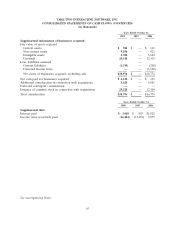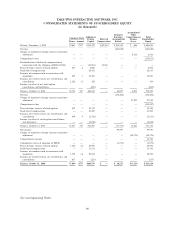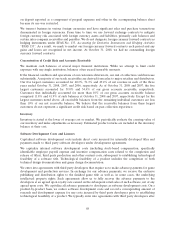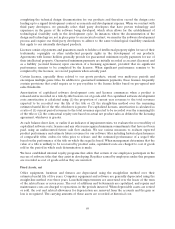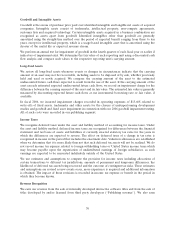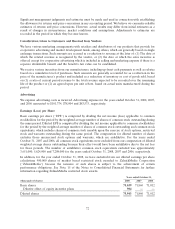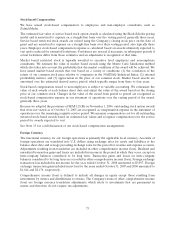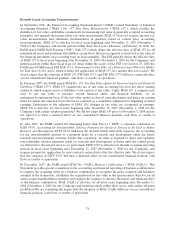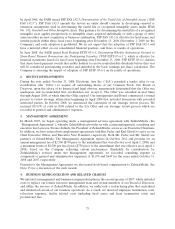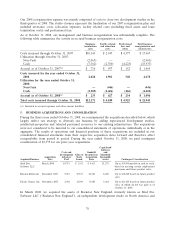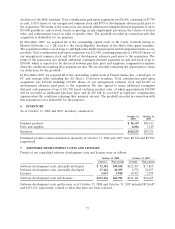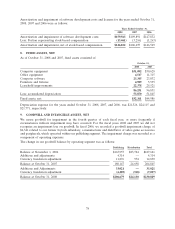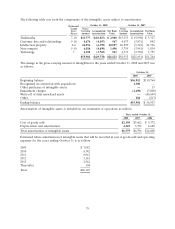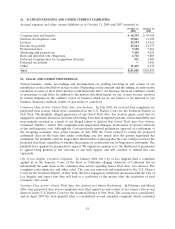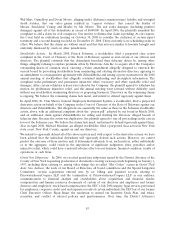2K Sports 2008 Annual Report Download - page 83
Download and view the complete annual report
Please find page 83 of the 2008 2K Sports annual report below. You can navigate through the pages in the report by either clicking on the pages listed below, or by using the keyword search tool below to find specific information within the annual report.Stock-based Compensation
We have issued stock-based compensation to employees and non-employee consultants, such as
ZelnickMedia.
The estimated fair value of service based stock option awards is calculated using the Black-Scholes pricing
model and is amortized to expense on a straight-line basis over the vesting period, generally three years.
Service based restricted stock awards are valued using the Company’s closing stock price on the date of
grant and are amortized to expense on a straight-line basis over their vesting period, also typically three
years. Employee stock-based compensation expense is calculated based on awards ultimately expected to
vest and is reduced for estimated forfeitures. Forfeitures are revised, if necessary, in subsequent periods if
actual forfeitures differ from those estimates and an adjustment is recognized at that time.
Market based restricted stock is typically awarded to executive level employees and non-employee
consultants. We estimate the value of market based awards using the Monte Carlo Simulation method
which also takes into account the probability that the market conditions of the award will be achieved. We
have issued market based awards that vest based on a variety of conditions: (1) the correlation of the
return of our common stock price relative to companies in the NASDAQ Industrial Index; (2) internal
profitability metrics; and (3) appreciation in the price of our common stock. Market based awards are
amortized over the estimated derived service period, which typically ranges from three to four years.
Stock-based compensation issued to non-employees is subject to variable accounting. We remeasure the
value of such awards at each balance sheet date and adjust the value of the award based on the closing
price of our common stock. Changes in the value of the award from period to period are recognized as
stock-based compensation expense in our statement of operations over the vesting period of the award,
generally three years.
Because we adopted the provisions of SFAS 123(R) on November 1, 2006, outstanding stock option awards
that were not vested as of October 31, 2005 are recognized as compensation expense in the statement of
operations over the remaining requisite service period. We measure compensation cost for all outstanding
unvested stock-based awards based on estimated fair values and recognize compensation over the service
period for awards expected to vest.
See Note 15 for a full discussion of our stock-based compensation arrangements.
Foreign Currency
The functional currency for our foreign operations is primarily the applicable local currency. Accounts of
foreign operations are translated into U.S. dollars using exchange rates for assets and liabilities at the
balance sheet date and average prevailing exchange rates for the period for revenue and expense accounts.
Adjustments resulting from translation are included in other comprehensive income (loss). Realized and
unrealized transaction gains and losses are included in income in the period in which they occur, except on
inter-company balances considered to be long term. Transaction gains and losses on inter-company
balances considered to be long term are recorded in other comprehensive income (loss). Foreign exchange
transaction loss included in net income for the year ended October 31, 2008 amounted to $5,097. Foreign
exchange transaction gains included in net loss for the years ended October 31, 2007 and 2006 amounted to
$1,644 and $2,176, respectively.
Comprehensive income (loss) is defined to include all changes in equity except those resulting from
investments by owners and distributions to owners. The Company’s items of other comprehensive income
(loss) are foreign currency translation adjustments, which relate to investments that are permanent in
nature and therefore do not require tax adjustments.
73




